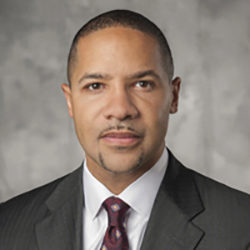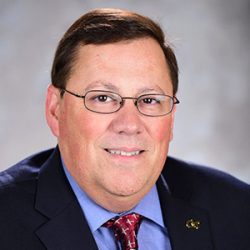 |
| Prof. Mitchell L.R. Walker II |
 |
| Prof. Dimitri Mavris |
The American Institute of Aeronautics and Astronautics (AIAA) announced this week that Daniel Guggenheim School of Aerospace Engineering professors Dimitri Mavris and Mitchell L. R. Walker II have each been singled out to receive the 2021 AIAA Sustained Service Award.
This award is presented annually to recognize significant, long-term service and contributions to AIAA. That description accurately describes both Mavris and Walker, whose commitment to research, scholarship and mentoring are no secret to their Tech colleagues.
"AIAA made terrific selections for this award," said William R. T. Oakes Professor and School Chair Mark F. Costello. "Dr. Mavris and Dr. Walker both have a long history of selfless service to the AIAA in a variety of roles."
AIAA evaluators commended Marvris, a Regents Professor, for "40 years of continuous meritorious service to AIAA in technical, honors and awards, publications, and international activities."
Mavris's primary research interests include advanced design methods, aircraft conceptual and preliminary design, air-breathing propulsion design, multi-disciplinary analysis, design and optimization, system of systems, and non-deterministic design theory. As the director of the largest lab on campus, Mavris has established a robust pipeline of sharp, industry-savvy, engineers who have supported AIAA's mission in research, industry, and academia.
"I am grateful and honored to be recognized by AIAA in this way," said Mavris.
"My connection to AIAA began during my freshman year here at Georgia Tech, so I have long appreciated the value of this organization and its importance to students and professionals in the industry. I currently serve as faculty advisor to the Georgia Tech AIAA student branch and it is still exciting to help these young people contribute to and benefit from the work being done by AIAA, to help them cultivate their professional network and take their first steps into their careers. AIAA continues to make valuable contributions to the discipline and I look forward to seeing the exciting developments that will arise as these new engineers create the next wave of new innovations."
The AIAA recognition is the latest in a legacy of achievement for Mavris. He is a Regents Professor and also holds the Boeing Chaired Professorship of Advanced Aerospace Systems Analysis and the S.P. Langley NIA Distinguished Professorship. He serves as the executive director of Georgia Tech's Professional Master’s in Applied Systems Engineering program at Georgia Tech. He is a Fellow of both AIAA and the Royal Aeronautical Society.
In its selection of Walker for this award, AIAA lauded the longtime AE professor and associate school chair for his technical leadership and active support of the organization. In addition to serving as an associate AIAA editor, Walker is an AIAA Associate Fellow and deputy director for Space Rockets and Advanced Propulsion. He is also a longtime member of the editorial board of Frontiers in Physics and Astronomy and Space Sciences – Plasma Physics.
Walker's research interests include experimental and theoretical plasma physics and advanced space propulsion. He joined the AE faculty after rotations at Lockheed Martin and NASA Glenn Research Center and established the world-renowned HPEP lab in 2005.
His reaction to the latest AIAA accolade was to heap praise on the organization, which he said had propelled him and others to greater things.
"AIAA has always been an asset to me, my colleagues, and my students. Early on in my career, it provided a platform for me to present my work, and to get feedback from leaders in the field. As I established myself in academia, it provided me and my students with a network that expanded our horizons," he said.
"But its most valuable contribution is the portal it provides to the next generation of our discipline. If I want to consider what the future of aerospace will be, I know I'll find engaging perspectives from my AIAA colleagues."